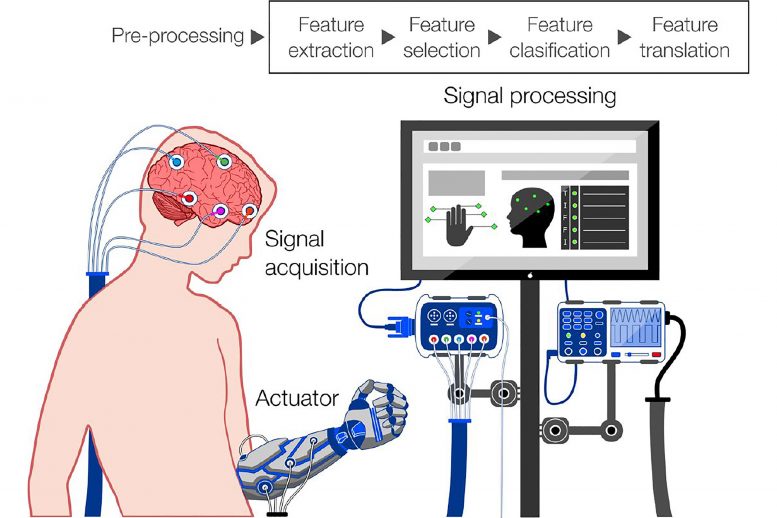
Researchers warn of the potential social, ethical, and legal consequences of technologies interacting heavily with human brains.
Surpassing the biological limitations of the brain and using one’s mind to interact with and control external electronic devices may sound like the distant cyborg future, but it could come sooner than we think.
Researchers from Imperial College London conducted a review of modern commercial brain-computer interface (BCI) devices, and they discuss the primary technological limitations and humanitarian concerns of these devices in APL Bioengineering, from AIP Publishing.
The most promising method to achieve real-world BCI applications is through electroencephalography (EEG), a method of monitoring the brain noninvasively through its electrical activity. EEG-based BCIs, or eBCIs, will require a number of technological advances prior to widespread use, but more importantly, they will raise a variety of social, ethical, and legal concerns.

Though it is difficult to understand exactly what a user experiences when operating an external device with an eBCI, a few things are certain. For one, eBCIs can communicate both ways. This allows a person to control electronics, which is particularly useful for medical patients that need help controlling wheelchairs, for example, but also potentially changes the way the brain functions.
Merging Identity with Machines
“For some of these patients, these devices become such an integrated part of themselves that they refuse to have them removed at the end of the clinical trial,” said Rylie Green, one of the authors. “It has become increasingly evident that neurotechnologies have the potential to profoundly shape our own human experience and sense of self.”
Aside from these potentially bleak mental and physiological side effects, intellectual property concerns are also an issue and may allow private companies that develop eBCI technologies to own users’ neural data.
“This is particularly worrisome, since neural data is often considered to be the most intimate and private information that could be associated with any given user,” said Roberto Portillo-Lara, another author. “This is mainly because, apart from its diagnostic value, EEG data could be used to infer emotional and cognitive states, which would provide unparalleled insight into user intentions, preferences, and emotions.”
As the availability of these platforms increases past medical treatment, disparities in access to these technologies may exacerbate existing social inequalities. For example, eBCIs can be used for cognitive enhancement and cause extreme imbalances in academic or professional successes and educational advancements.
Regulatory Dilemmas in Neurotechnology
“This bleak panorama brings forth an interesting dilemma about the role of policymakers in BCI commercialization,” Green said. “Should regulatory bodies intervene to prevent misuse and unequal access to neurotech? Should society follow instead the path taken by previous innovations, such as the internet or the smartphone, which originally targeted niche markets but are now commercialized on a global scale?”
She calls on global policymakers, neuroscientists, manufacturers, and potential users of these technologies to begin having these conversations early and collaborate to produce answers to these difficult moral questions.
“Despite the potential risks, the ability to integrate the sophistication of the human mind with the capabilities of modern technology constitutes an unprecedented scientific achievement, which is beginning to challenge our own preconceptions of what it is to be human,” Green said.
Reference: “Mind the gap: State-of-the-art technologies and applications for EEG-based brain-computer interfaces” by Roberto Portillo-Lara, Bogachan Tahirbegi, Christopher A.R. Chapman, Josef A. Goding and Rylie A. Green, 20 July 2021, APL Bioengineering.
DOI: 10.1063/5.0047237
Never miss a breakthrough: Join the SciTechDaily newsletter.
19 Comments
Unequal adoption is the case with every new technology. Should cell phones have been prohibited because the first analog cell phones were to expensive for most to afford? What about heart transplants, or personal computers?
The way things become inexpensive, is for the first adopters to pay the cost of mass production, or for their purchases to attract capital the capital needed to mass produce.
As far as a blead cyborg future, as long as use is voluntary, I see no problem.
… a root kit of the human brain, not that strange now…
So long as it’s not wirelessly controllable I don’t see the harm I however do not like the idea of internal chips I don’t mind the idea of actual interface nano lines being inserted though
Some socialist inclined “ethicists” think capitalism is immoral. What’s new?
Life isn’t fair. Even equality of opportunity will never happen much less of outcome. The closest we get is when we are all poor together.
From the moment I understood the weaknesses of my flesh, it disgusted me.
The machine will save us, praise the omnisiah!
I personally can’t wait for this kind of augmentation, though I respect the opinions of people who are against it
I agree with William Readling with the caveat that potential users are properly informed of pros and cons, as well as given an easy out if they change their minds after the fact.
This sheds light on the long standing watch for the “mark of the beast” so associated with 666.
Once installed, people become “like gods”, and once you taste of the power/ability, you don’t want to give it up.
Regarding the article here about technologies interacting with the human brain & grave concerns both ethical & moral . Are you aware of the recent research that has come to light from Spanish scientists who have analysed a vial of the covid vax injection & found nano graphene oxide ? I would be interested to read your analysis of this research . Refer to La Quinta Columna
Apoc 13:11-17 anyone?
In a way even my phone has become an extension of myself… My profiles are my identity; the internet my brain. I can passively learn and the algorithm will feed me more and I can actively seek out knowledge to fill gaps that come to mind. It’ll be interesting to see how far this gets before society collapses sometime this century. Thank for you this article, almighty singularity.
So Basically, we’re looking at an episode of Ghost In The Shell 🤔
The author references the fact that participants in trials that use the technology to help them e.g control wheelchairs that they would otherwise be unable to control do not want to have the technology removed at the end of the trial. The author then goes on to describe this unwillingness to relinquish the technology as a “potentially bleak mental and physiological side effect”. How is a desire to continue to access technology that drastically improves one’s life a “bleak mental and physiological side effect”? That’s like saying that wheelchairs are problematic because paraplegics who have used them won’t want to give them up once they have experienced life with a wheelchair. Duh! That’s not a bleak mental and physiological side effect, that’s common sense and a testament to their effectiveness. And don’t get me started on the author’s criticism of new technological developments because they might lead to inequality because not everyone will be able to access them equally. The same thing could have been said about every technological development from the beginning of time. What an ignorant perspective. By that logic we should still be living in caves and eating raw meat until every Neanderthal could be assured access to fire, tools, and shelter. Ridiculous!
I also believe this is the beginning of the “mark of the beast” as for told in the Bible. It could come to the point where people are handing themselves over to technology and are no longer able to distinguish reality from fantasy. They will be giving up their spirit and their soul, and no longer be able to have a spiritual connection with their Creator God. Getting the mark of the beast will seal ones fate to eternal darkness.
Organized gangstalking is the main threat, exacerbated by the review ability of any targets intellectual property….
It’s all about control
It will get interesting when prosthetics get better than the original limb. Will people want to upgrade from what they have naturally to replacemnet with a superior device, ie Borg like electro mechanical tools?
If the new parts were strictly biological and not mechanistic, could we replace our exteriar parts for more beutiful parts even a new face to maintain youth or even get new youth.
Age is only a number would have a whole new meaning if an old person can look/feel like a young person again with such augments.
Get ready to buy monthly subscriptions for an AdBlocker that automatically unsubscribes notifications sent to your thoughts.
This is similar to the AI threat at the end of the century. Provided the world cannot agree on regulations, doomsday is inevitable. Our technology is becoming too powerful. This technology should be celebrated and accelerated, but political disarray makes me think negative outcomes are very likely. Free market capitalist will use the technology however they want to consolidate more leverage.
Please. People have access to all the knowledge on the world via their smartphones, and they’d rather look at up Youtube lists all day. Do you REALLY think humans will use this to become supermen?